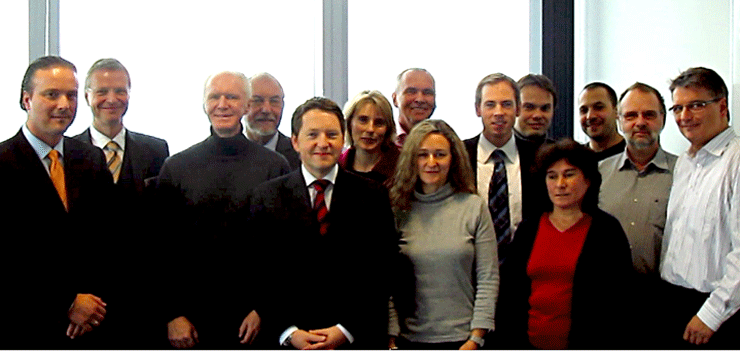
 Felix
Keck is tall and smart and looks in shape; he possesses a kind face
that breaks into a smile that feels instinctual no matter what he is
talking about. Felix
Keck is tall and smart and looks in shape; he possesses a kind face
that breaks into a smile that feels instinctual no matter what he is
talking about.
His appearance and manner seem to go against
the accepted profile of a computer geek—insular and bright, glued
to a key board and always in search of the next big program breakthrough.
But as CEO of Frankfurt-based TRAXON,
where he operates from an ultra modern office complex with windows that
overlook both a small, peaceful forest and the main runways at Frankfurt
Airport offering constant take off and landings, Felix Keck commands
one of the more varied and powerful air cargo IT systems in the world
today.
Although Felix lauds almost everything
about air cargo, he admits that when it comes to mandated cargo security
disciplines coming down from lawmakers around the globe and the move
toward paperless cargo and e-freight, many people will usually wait
until the last minute before moving toward compliance.
Whether the waiting is due to procrastination,
or for the other shoe to drop, or just human nature is left up in the
air.
TRAXON began in 1991, when Air France,
Lufthansa, Cathay Pacific and Japan Airlines launched a global communications
system with the aim of facilitating the exchange of information between
airlines and cargo agents.
The result was – for the Western
Hemisphere – “Global Logistics System Europe Company for
Cargo Information Services GmbH,” operating under the trademark
TRAXON.
TRAXON India and Global Logistics System
Asia Pacific complement the group.
TRAXON Europe headquarters are located
in Frankfurt am Main, with an additional office in Paris. TRAXON India
–a joint venture of TRAXON Europe with an Indian partner –
has its headquarters in New Delhi, with offices in Bombay, Bangalore,
Calcutta and Chennai. Global Logistics System Asia Pacific has headquarters
in Hong Kong, with additional offices in Seoul and Tokyo.
Today, the TRAXON network links partners
around the globe.
More than 90 airlines and 3,000 forwarders
with approximately 9,000 offices are currently connected to the TRAXON
network.
But to Felix Keck, who moved over from
Lufthansa, the TRAXON mantra is straightforward.
This is one company in the right place
at the most opportune time, as he declares:
“The industry is well on its way
to paperless airfreight communication.
“The key to success is to focus
on the e-process.
“This year, 2010, has been a good
year.
“We will increase our messages from
144 million last year to 157 million by year’s end, up 9 percent
as one performance indicator of how we are doing.
 |
“Looking back a few
weeks ago, we are stunned (in retrospect) at the shear amount of new
products we launched in 2010.
“In fact, we cannot recall another
year where TRAXON brought so many products to market.
“The TRAXON new product surge began
with eCargo Pouch, which was announced last January.
“Next, we knew that European import
customs filing was coming, so we launched our customs product and currently
have 15 airlines utilizing our solution.
“But our reach goes even further,
as TRAXON has launched solutions for Nigeria Customs and South African
Customs in 2010 as well.
“TRAXON also debuted ‘Air
Waybill Data Capture’ in 2010, which gives forwarders a web-based
opportunity to send data to our system that in turn allows airlines
to rapidly access and act upon the data.
“While these products are new and
innovative, each one is building audience every day.
“For example, eCargo Pouch acts
as a tool for e-freight that has varying and different deadlines depending
upon who you are talking to.
“But I think adding lack of consequences
to vague deadlines has been a real deal breaker for implementing widespread
air cargo e-freight.
“Also, the varying systems have
caused some confusion.
“What we have done at great effort
has been to forge a single platform agreement between the systems of
TRAXON Europe, Cargonaut (Netherlands) and Cargo Community Network Pte.
Ltd. in Singapore.
“Our agreement to join hands and
align one product globally offers air cargo one system for Asia, Europe,
Africa and America.
“It also allows us to share costs
and advance technologies together while developing a single application
that is easily accessible by everyone in transportation.
“What we have done is offer a global
solution instead of a local one and we think that is a key solution
to moving e-freight forward.
“When you look at it, there are
not that many systems offering e-freight.
“The challenge is that e-commerce
systems are either local or attached to one carrier.
“We are hopeful that our offer is
regarded as a viable industry solution to move e-freight into wide spread
global usage.
“The ongoing challenge is the divided
nature of a business that moves cargo between airline, forwarder, shipper,
consignee, warehousing and trucking.
“But now everybody, no matter what
IT they may feature, can utilize our system to get on the same page.
“Here is how it works:
“Normally, as soon as he books a shipment, a forwarder can open
an electronic pouch, adding whatever documents that need to be connected
to the shipment (declaration, invoice, etc.).
“The forwarder then gets an authorization
code that can be made available to any other party the forwarder chooses,
thus enabling partners to access the information they need.
“The big challenge to all of this
is the ongoing question of who pays for the service.
“The forwarder greatly benefits,
avoiding manual input problems, fax or mailing costs and everything
else connected to paper.
“There might be ten pieces of paper,
three faxes and other costs for just one shipment.
All of this
increases costs and decreases efficiencies.
“TRAXON believes it is time to go 100 percent electronic, because
in the long run efficiencies improve and costs come down, driving profits
up.
“When I think about it, during 2010
e-freight may have been a bit overshadowed by Import Control Systems
(ICS) mandated January 1, 2011 by European Customs, but we are hopeful
next year that will change.”
We asked Felix Keck if right now he might
be feeling a bit of frustration after having made major investments
in advanced IT, expanding that effort to international cooperation with
others to deliver services that work globally.
He thought a moment and offered:
“Sure, we have felt the impact of
our product development moving slowly as e-freight struggles to take
hold, but then there have been other opportunities that have come to
the front, including the recent surge in interest and activity as ICS
takes hold.
“So while we have felt some frustration
about the pace of implementation of e-freight, we have had real joy
seeing the interest in TRAXON as European ICS takes hold.
“Maybe it would be too much joy
to have both at the same time,” Felix laughs.
Felix Keck came to air cargo IT from the
ocean shipping business, where he worked as nautical officer for Shell
Cyprus.
Later, he began his airline career at
Lufthansa Cargo where, among other things, he oversaw the fortunes of
the Boston USA cargo business.
He recalls operating Lufthansa Cargo from
an old Pan Am Clipper Cargo shed at Logan Airport.
“We had a huge Clipper Cargo illuminated
sign on our Boston acceptance and pick up building that was so big and
bright, most people—truckers and such—looking for our operation
could not see the smaller Lufthansa Cargo sign.
“I learned there is an entrepreneurial
can do spirit about the air cargo business that I find quite appealing..
“When all attempts to disconnect
the old PAA sign failed with the airport, we just unplugged it ourselves.”
Felix Keck joined TRAXON in 2004 and has
never looked back or regretted one minute of it.
“I may have the best job.
“I get to work every day with a
microcosm of the world’s population. Here at TRAXON we have 17
nationalities among our 30 staff members and we are involved in bringing
change for the better to an entire industry.”
We asked Felix Keck what surprised him
in 2010.
“I have been impressed by the number
of products that TRAXON developed and brought to market this past year;
by this compact, dedicated team of sales and technical experts that
we have here in Frankfurt; and that we were able to create and implement
these programs on top of the increase of business this year.
“Everyone knew that European ICS
was coming January 1, 2011, but now we are faced with a year end surge
for our services as more and more companies request the TRAXON solution.
“So everyone waiting until the last
minute, while challenging, is also most welcome business for us.
”People know that TRAXON can deliver
its promise of a customs solution to all countries that demand advance
filing from one provider.
“TRAXON offers ICS implementation,
support and best quality—the complete package.
“We are still in talks with airlines
that have yet to settle upon an IT solution for European ICS.
“Looking ahead a few weeks, what
that means is that some key members of our team will be spending their
Christmas vacations right here in the office.
“Our team is ready and we expect
to be at it here even between the Christmas and New Year, a period that
is normally quite a slow time.”
So after potentially a “December
to Remember,” we wonder: what is next?
“For 2011 we will go deeper into
studying our customer processes so that all of our products work even
better and so we evaluate areas to develop new ones.
“For us, that activity is actually
happening all the time.
“TRAXON conducts workshops and does
all manner of product development as a result of customer visits and
ongoing dialogue.”
Geoffrey/Flossie
|






